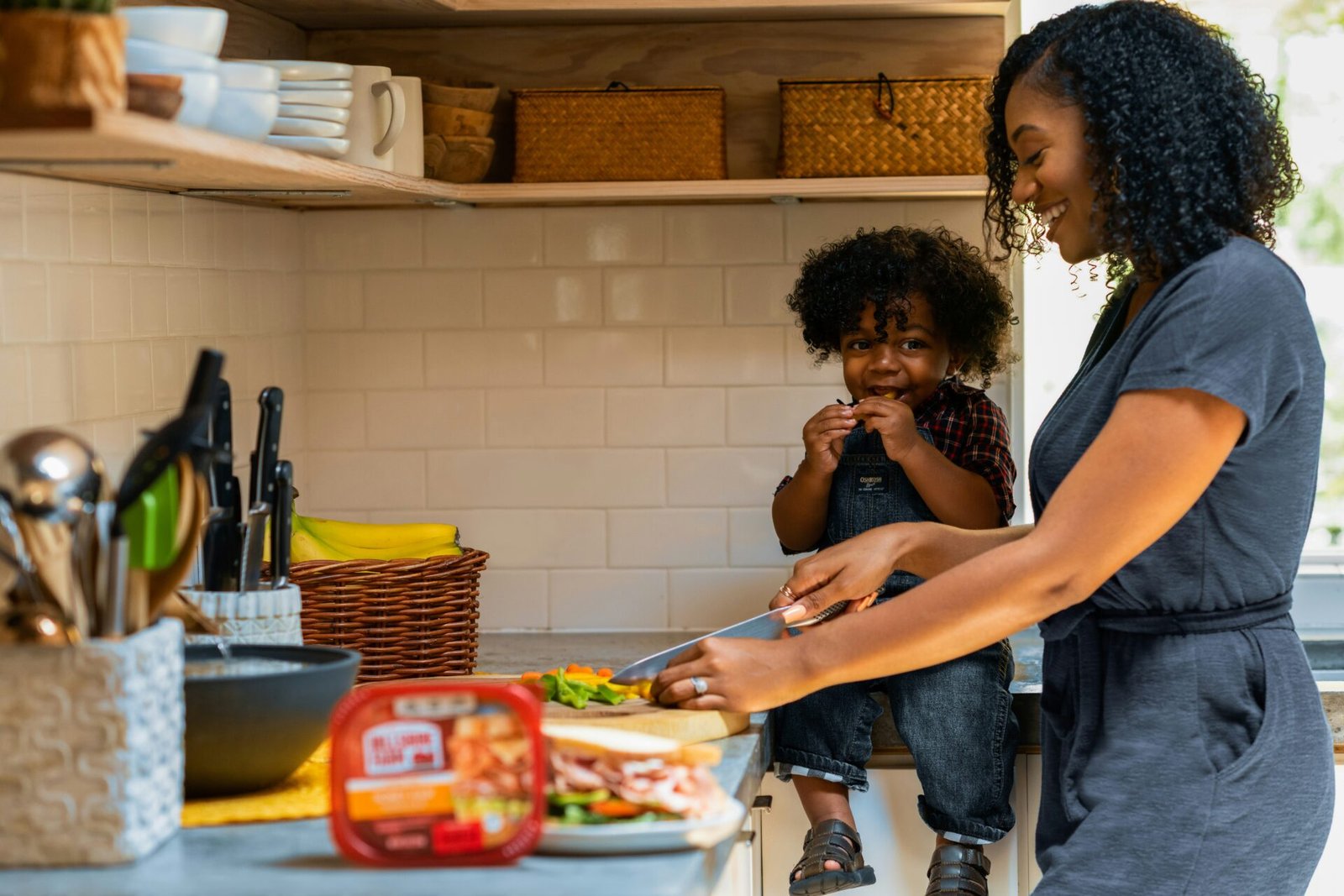The first anthropological parenting book I read was The Continuum Concept by Jean Liedloff, and it’s in my top 10 parenting books. The second was Hunt, Gather, Parent by Michaeleen Doucleff, which clearly joins the top. Among other things, she talks about how to teach a child to clean up after themselves and take care of the house in general, to cook and to perform other household duties and to coexist harmoniously with others and, as a bonus, how to reduce the amount of stress, tension and arguments.
The creation of the nuclear family remodeled how we parent, but also how we learn to parent. Goodbye, Grandma. Goodbye, Aunt Carol. And goodbye parenting knowledge, skills, and extra arms for holding, cooking, and rubbing little backs at bedtime. Hello isolation, exhaustion, and stress.
Hunt, Gather, Parent by Michaeleen Doucleff
I often talk about the inclusiveness of children in society, but I barely manage to include my own child in the family. I want to do everything quickly and have the maximum amount of time alone. I don’t want to clean up what happened as a result of children’s “help”. At the same time, I worry that I can raise another helpless man and complain that I spend not enough time with my child. Of course, this is primarily because I am raising a child alone, and I still haven’t fully understood how to rebuild my life taking my own motherhood into account. But there is a way out, even in such a small family. It is reduction of the gap between a child and an adult.
Partnership model
Ideally, everything starts with the division of responsibility and the formation of a culture in which mother and child are not outsiders, but honorable members of society. The hard work of carrying a child in a womb, giving birth, and breastfeeding should be the highest social value. Complete calm and support should prevail in this area. This is the base. And then the value of the partnership model must be shared with this child. But now that the situation is reversed, we must change the world from the inside – from within our own family.
Today, the value of partnership is rather absent, and children are rather brought up in a dominant system, read – slaves called to follow orders. For a child, such growth is an unnatural pain that results in suppression of one’s own emotions, social dysfunction, bad habits, and inflicting pain on others in adulthood. And sometimes even in the childhood.
How to instill a partnership model in a child
Raising children with a model of partnership thinking involves instilling the values of equality, empathy, mutual respect and cooperation from an early age. How to achieve this:
The Relational Equality Model: Children learn by watching their parents. Let’s demonstrate a balanced relationship, when both partners share responsibility, make decisions and respect each other’s opinions. Let them see that household duties, emotional labor and child rearing are shared equally.
Emotional intelligence: Encourage children to recognize and express their emotions in a healthy way. Let’s help them understand the importance of empathy, active listening, and communicating their feelings without fear of judgment. This promotes emotional openness, a key component of the partnership model.
Encouraging cooperation: Involve children in family decision-making where appropriate, teaching them the value of cooperation and shared responsibility. Whether it’s planning an event or doing chores, let’s let them participate in it on a partnership level. This does not mean 50/50, it means recognizing the value of the child’s contribution.
Michaeline Ducleff writes that Western society is used to seeing children as those who need to be taught. That is, parents have a vision of how things should be done, and this vision is imposed on the child, thereby impoverishing our lives and demotivating the child. Because even when a child has no experience, they have their own vision and interesting ideas. And even when they don’t work, it’s better when the child sees it himself, without “I told you”. Besides, what if they they actually work?
Gender stereotypes: avoid reinforcing traditional gender roles. Tasks are assigned not by gender, but by interests and abilities. There are no male and female things to do, there are just things to do.
Mutual respect: Let’s teach children to respect their own and other people’s boundaries, opinions and autonomy. Let’s encourage them to resolve conflicts through respectful dialogue rather than power struggles. This, of course, is possible only if we ourselves refrain from authoritarianism. Raising should not be based on orders and obedience, but on interaction and cooperation.
Balance individuality and togetherness: While fostering a sense of partnership, it is also important to teach children to maintain their individuality. Let’s encourage them to develop their interests and maintain their independence, while at the same time valuing cooperation in the family.
Key principles of harmonious education
Psychologists have found that children who are involved in family affairs grow up to be more responsible and independent. They associate work with positive emotions, not with punishment. With a sense of belonging and self-worth. Moreover, family cooperation helps children learn to work as a team, something that is often lacking in Western society with its cult of individualism. Therefore, if we want to avoid the problems of teenagers who appear on the kitchen only when it’s time to have dinner and refuse to clean up after themselves, we need to start from a young age.
Cooperation instead of fighting
In particular, our culture focuses almost entirely on one aspect of the parent-child relationship. That’s control—how much control the parent exerts over the child, and how much control the child tries to exert over the parent. The most common parenting “styles” all revolve around control. Helicopter parents exert maximal control. Free-range parents exert minimal. Our culture thinks either the adult is in control or the child is in control.
Hunt, Gather, Parent by Michaeleen Doucleff
Parents and children are not rivals, but partners. No one likes to be controlled, and children are no exception. The constant struggle for power creates tension and interferes with the child’s emotional development. The more we insist on something, the more resistance we get in return.
Instead, let’s focus on collaboration. For example, let’s involve children in household duties: let small children hold the watering can when we water the flowers, or put books on the shelf – it can be any action that the child can do. Let’s invest not in toys and not in dramatizations, but in real help in real life.
The role of children in the family
If a child misbehaves, they need more responsibilities.
Hunt, Gather, Parent by Michaeleen Doucleff
Children naturally want to be useful. In many cultures, such as the Mayan, it is believed that even the youngest members of the family have a purpose. Involving children in joint work helps them feel important members of the family, and also develops responsibility. The main thing is that it is based on trust, not threats.
Learning through action
We often underestimate the capabilities of young children. Yes, at first they may do something clumsily, but each attempt is a step towards improvement. Our task is not to do everything for the child, but to help them learn. The Maya do it without instructions or criticism: watch and repeat. Moreover, they do it without yelling. When we yell, we teach the child to yell, that’s all. For us, westerners, this is a level of God.
Praise is a separate topic: Western society is used to shouting “well done” for almost every slightest movement. Praise belongs to the same category of punishment-rewards, which takes away a child’s natural motivation. The Maya recognize the child’s contribution, but do not tie it to a specific action, it is rather a statement of the fact that you have done something for the family. They also tie the child’s actions to maturity: this is the behavior of a child, and this is the behavior of an adult. Children want to be adults.
Freedom to try
If the child shows interest in some task, let’s support them. Let them participate as much as they can at this stage, even if it doesn’t work out perfectly. It is important that it is voluntary and that the child can just as freely switch to another task.
If a child says no, or ignores you, leave it alone. Try again later. We’re training the child to cooperate, not to obey the parent. Part of working together is accepting a child’s preference when they choose not to help.
Hunt, Gather, Parent by Michaeleen Doucleff
In the summary
In Western culture, we go to extra efforts to draw a line between the kid world and the adult world. Kids go to school; parents go to work. Kids go to bed early; parents go to bed late. Kids eat kid food; parents eat “adult food” (as my seven-year-old niece told me last summer). The separation is sharp. But it doesn’t have to be this way. Your job is to find opportunities to merge the two worlds. And there are many, many opportunities. You just have to learn how to spot them.
Hunt, Gather, Parent by Michaeleen Doucleff
Many of us have fallen into this trap: we “live life” while the child plays in the next room. As a result, the child is completely unprepared for life, and the relationship collapses because of this gap. We may even feel guilty for not playing with the children. But what we call play, is actually honing skills and satisfying an interest in how things work, it’s not about toys at all.
There is no boredom if the child is nearby and included in joint activities. Even if the mother is just working at the computer, it is better for the child to see exactly what the mother is doing and do something of her own, but nearby. And maybe even here it’s possible to find a small task for a child.
At first glance, it is more difficult to live together: work, rest, do chores, etc. But this is just a way to an easier life and a way to live more harmoniously. This is, after all, a working way to “make” a child clean up after himself. One wants to feel a sense of belonging. One is motivated by their own worth.
Literarure
- Michaeleen Doucleff – Hunt, gather, parent
- Jean Liedloff – The concept of the continuum



